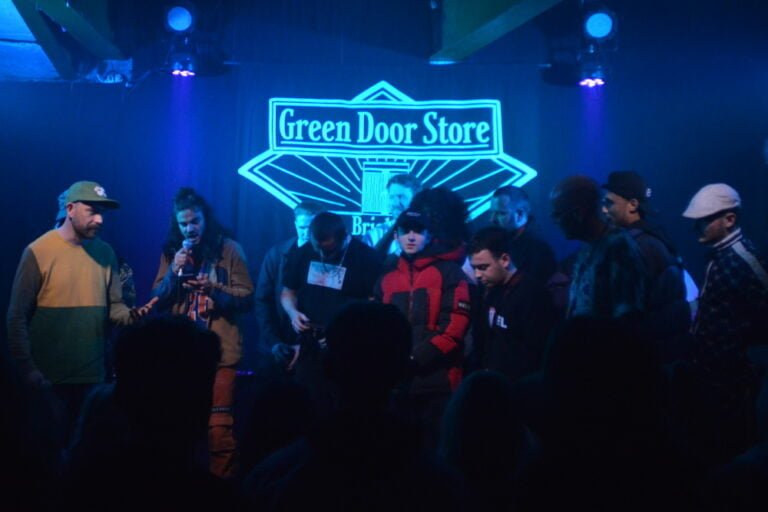As part of Mental Health Awareness Week 2023, we interviewed Room to Rant counsellor Katy. She told us all about this unique and impactful project, including her proudest moments and what we should know about young men’s mental health.
But first, please enjoy our short video of Room to Rant’s recent showcase gig.
What is Room to Rant?
Room to Rant is a collaborative project between Audio Active, a music charity which engages with young people, and YMCA DownsLink Group. Room to Rant is a group space for people who are male or identify as male, where people can drop in and write lyrics or freestyle. We also do a check in, and I’m there as a counsellor to offer professional guidance around signposting and safeguarding. And then if there’s a need for it, or people want to, they can have counselling with me one-on-one for 16 to 24 sessions.
Who is Room to Rant for?
Room to Rant is for 16- to 25-year-olds that identify as male. Generally, there’s two pathways: people that already rap and are into making music, such as participants from other parts of Audio Active, who realise they might need some added support; or sometimes people can just be referred in through colleges. They can come in for those reasons or sometimes it can be purely for the counselling part and then they can come to the group if they want to. It’s not all people that can make music either. We do have some people who initially started out just wanting to come and be in the space and through that experience they’ve learnt to get into the music part and given writing a try. And people that were more shy and not so confident or didn’t want to be rappers, still get benefit from it. It draws different kinds of people for different reasons.
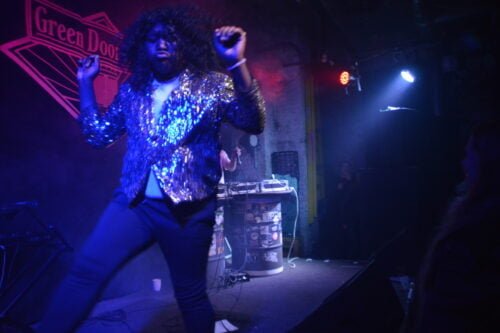
What happens during a Room to Rant session?
It’s a drop in space so people can come and go as they please as there is no expectation to be there every week, which is quite unique. We’ll sometimes play each other music that we’re listening to at the moment, or lyrics that might have some meaning to us, such as how we might be feeling that week. Then they might do some freestyle rapping or show the sort of music that they’ve been working on. Next, we do a check in where we go around and talk about how our week’s been, how we’re feeling emotionally. And that’s the opportunity for me to gauge where people are at and ask if counselling would be something they’d like to do.
It’s very natural, me being in the group allows me to build a relationship with those young people as well, because generally the people that go there might have had counselling in school or been part of other interventions, but they may not have a great opinion of these or feel failed quite often. So, it’s just a different way to reengage with that process. And I think it works really well.
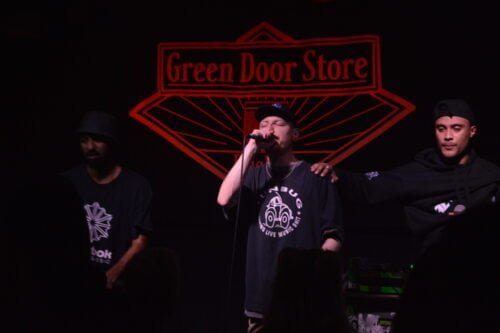
Why does this work so well?
I think because a lot of young people might have been signposted or suggested in school that they see a counsellor, but it’s not something they want to do and it’s just a nameless person behind a door that they see every week. Whereas in this project, I’m there every week, they get to know me and there’s that consistency and opportunity for them to realise that I like music as well.
I really like breaking the stigma of what people think counselling is. The way that I work as a person-centred counsellor is that it’s completely their time, so it’s up to them how they spend it. And sometimes I notice that there’s an expectation that they have to come with heavy stuff to talk to me about. But when they realise that’s not what they have to do, I find they relax into the process more and it’s not necessarily about digging up trauma from their past. They can just talk to me about their week or show me music or even write lyrics with me in the sessions. It’s a lot more relaxed.
How did you get involved with the project?
I was on the hunt for a new job and saw this one advertised and thought, wow, this is made for me. I have experience with music, I went to college and did music production, I’m a singer and can write songs, so it was combining two things that I had knowledge of. And I’m very familiar with Audio Active as a charity. I’ve grown up being involved in the music scene in Brighton, I already knew a lot of the people that work at Audio Active, so it seemed like the perfect fit.
And I legitimately like hip hop music. I think that’s also part of this process of maybe changing the young people’s opinions of a counsellor or even just being a female in a male dominated space. I think at times it’s challenging, but that also really helps them to have a positive relationship with a female in that world.
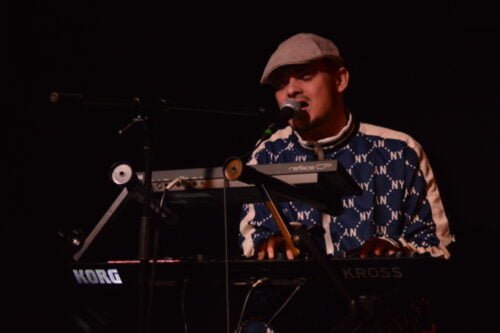
Why did Audio active start this project?
I think it was the baby of John Clarke who works at Audio Active. I think Room to Rant has been running in some capacity for four or five years previously with other counsellors. It’s grown and they got three years worth of funding from Red Nose Day which is now running out.
What do you find unique about Room to Rant?
Everything’s unique about it. The nature of it, and the fact that it’s a drop in space means it’s on the participants to make that commitment if they want to come every week. There’s clearly something they’re getting from the experience, whether it’s the group, the counselling, or if they just want to make music. There’s that freedom, but also that added level of care. I don’t think there’s many spaces for young men to say how they’re genuinely feeling and I think for them to witness that in the group is so important for them to be able to hear each other, because actually some of the most beautiful parts of the group experience is not us interjecting, it’s actually the young people giving each other advice or little pep talks or just a little pat on the back to say, it sounds like you’re going through a hard time. That means so much. It’s so powerful.
They take care of each other. I was working with someone 1-1, there was a lot of safeguarding and we ended up doing an internal review of why they hadn’t been picked up by other services. So initially that work with them was quite challenging because I was scared to break the relationship that we had in counselling. But once he saw the benefit of me doing that, he started doing that for one of the other people in the group. He called me and said that he was really worried about another person in the group. He shared their situation with me and asked me to do some safeguarding for him. Initially it might seem terrifying to ‘snitch’ because his friend told him not to tell anyone, but it actually really shows that community spirit, and him looking out for his friend because of the experience that we’d had together. That young person is actually now in counselling with me. Because he was like, OK, you’re looking out for me so I’ll take that risk to come and talk to you about what’s going on with me. I think them looking out for each other is the unique part of the group experience.
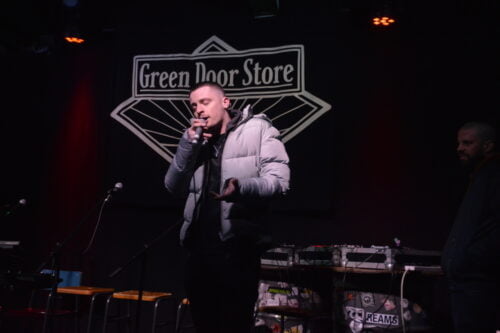
As you do both, please can you explain the difference between counselling and youth work?
Youth work is much more practical and hands on. For example, I’ve gone with people to the Youth Advice Centre, or to the police station for support. And then counselling is more listening, facilitating, empowering. I don’t give suggestions or tell somebody what they should or shouldn’t be doing, it’s more about us working collaboratively to build that relationship so they can make those choices for themselves. I do appreciate that it’s quite out there for a counsellor to be doing those two roles, but the young people seem to know the difference.
Initially it challenged me because it’s all about boundaries. But it crosses over because what we work with together in counselling then might cross over into me saying, OK, there’s a suggestion that you might want to go to the Youth Advice Centre to get some housing advice. And they’re like, yeah, but I don’t feel confident going and I can say, well, would you like me to come with you? And that gives them the confidence and support to do things that they wouldn’t do by themselves.
What has Room to Rant taught you?
It’s taught me so much. I think the main thing which probably seems obvious is that I believe in change more than ever. And maybe to look at things slightly differently. As a counsellor, I think I do this anyway, but to sometimes read between the lines of how someone may present to you, there’s often a lot more going on underneath the surface.
What would you like people to know about mental health in young men?
Again, not assuming that what you see on the outside is all there is to it. Sometimes being really upset can manifest or be shown as anger. But it’s just taking time, and to not be scared, to ask questions and actually sit with that. It might be uncomfortable to see somebody you know really angry or stressing out, but tackle that head on and reassure somebody that you’re there. There’s a lot of men struggling quietly and maybe they don’t realise that it’s OK to share how they’re feeling and that they don’t have to deal with it on their own or shut down, because it’s not the done thing or manly. I think that change comes from witnessing each other doing it and realising it’s actually alright for us to say that we’re not feeling great. There’s a lot of people struggling right now, and there’s a lot going on in the world that adds to that.
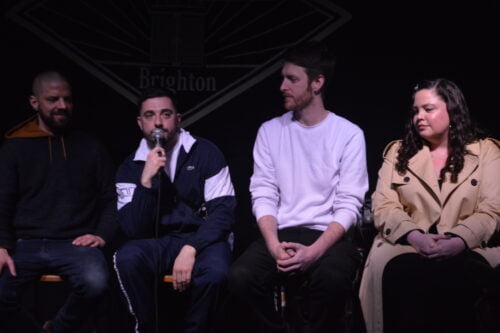
What are some of your proudest moments working in this project?
I might get emotional now! I think some of my proudest moments are working with people who wouldn’t have ever got involved in the process. There’s a young person that I’m still working with who I first met him, walked into a session completely intoxicated, with one shoe on and said he’d lost his bag. He knew the group was running and turned up in an awful state. One of the people took him out and tried to look for his bag. When they left, he tried to throw himself in front of a truck and ended up being in A&E to make sure that he was safe. Someone from Audio Active said he would really like to have counselling and asked if would work with him. I wasn’t 100% sure whether he was ready for the process.
The first times I met him in a cafe, he seemed OK, but was very vague and didn’t want to stay for very long. We then transferred these into one-on-one counselling together. He came to the session intoxicated and I had to say to him, you know, you’re intoxicated, which he argued with me about. I had to cut the session. But from then on, he understood the boundaries, and came back the week after and wasn’t intoxicated. We’ve been able to build a really great working relationship. He was homeless but is now housed. He used to cut the session short as he could only do about 20 minutes before feeling too uncomfortable, whereas now he’ll sit through the whole 50 minutes and won’t realise the session’s coming to an end. I’ve watched him progress so much and he gets so much from just being there every week, having an appointment that he keeps to. It’s a huge shift. And I’m not saying that everything in his life’s great, he’s still got his challenges. But even to commit to that process, which is something that he would never have done before, is amazing.

